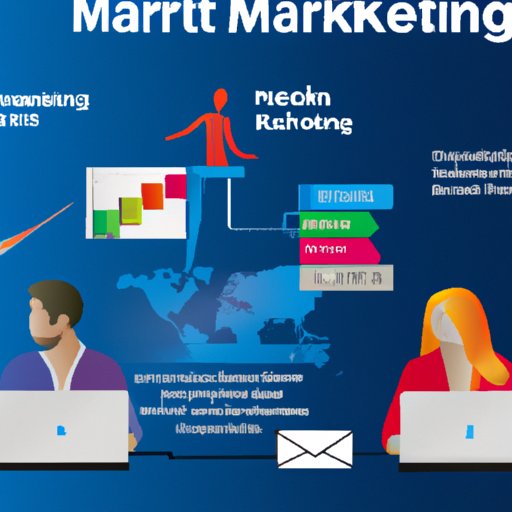Introduction
Marketing is a key element of any successful business. It involves developing strategies to reach potential customers and increase sales. By understanding the role of marketing in business, companies can create effective campaigns that will help them reach their goals and gain a competitive edge.
Definition of Marketing
At its core, marketing is the process of creating and delivering products or services that meet the needs of customers. It involves research, advertising, promotion, and distribution activities. The goal of marketing is to generate leads and drive sales, as well as establish a strong brand identity and build customer loyalty.

Overview of the Role of Marketing in Business
The role of marketing in business is to understand consumer behavior and identify target markets. Companies use marketing to craft strategies that will attract these target markets and convert them into loyal customers. They also use it to create a brand identity and enhance their reputation. Effective marketing strategies can help businesses increase visibility, build customer loyalty, and maximize profits.
Exploring the Impact of Marketing on Business Success
Understanding consumer behavior is critical for businesses to succeed. Companies need to be able to identify their target market and understand their needs and preferences. Through market research, companies can gain insight into what consumers are looking for and how they make decisions. This information can then be used to develop effective strategies to reach those target markets.
Establishing a brand identity is another important aspect of marketing. Companies need to create a unique image that distinguishes them from their competitors. This image should be consistent across all platforms and be recognizable to consumers. A strong brand identity can help businesses build customer loyalty and increase sales.
Generating leads and increasing sales is one of the primary goals of marketing. Companies need to create campaigns that will capture the attention of potential customers and persuade them to purchase their products or services. This involves crafting strategies that are tailored to the target audience and utilizing the right channels to reach them.
Analyzing the Role of Marketing in Developing a Sustainable Business Model
Identifying target markets is essential for businesses to develop a sustainable business model. Companies need to determine who their ideal customer is and how to best reach them. This requires market research and analysis to gain a thorough understanding of the target market’s needs and preferences.
Crafting strategies to reach those markets is the next step. Companies need to create campaigns that will capture the attention of potential customers and motivate them to take action. This involves selecting the right channels and utilizing the right messaging to effectively engage the target audience.
Once the strategies have been crafted, companies need to implement them in order to achieve their goals. This involves tracking results and making adjustments as needed to ensure that the desired outcomes are being achieved.

Understanding the Benefits of Effective Marketing Strategies
Increasing visibility is one of the primary benefits of effective marketing strategies. Companies need to ensure that their products and services are seen by potential customers. This can be done through various channels such as search engine optimization, social media marketing, and paid advertising.
Building customer loyalty is another benefit of effective marketing strategies. Companies need to create campaigns that will keep customers engaged and encourage them to come back for more. This involves providing incentives such as discounts, free shipping, and loyalty programs.
Enhancing reputation is another key benefit of effective marketing strategies. Companies need to create campaigns that will build trust and demonstrate their commitment to providing quality products and services. This can be done through positive word-of-mouth, customer reviews, and industry awards.
Looking at the Different Types of Marketing and Their Benefits
Traditional marketing involves print, radio, and television advertising. This type of marketing has the advantage of reaching a wide audience, but it can be expensive and time-consuming. Digital marketing involves using online platforms such as websites, email, and social media to reach potential customers. This type of marketing is cost-effective and can be targeted to specific audiences.
Social media marketing is another type of marketing that has become increasingly popular in recent years. This involves using social media platforms such as Facebook, Twitter, and Instagram to reach potential customers. Social media marketing is cost-effective and provides companies with the opportunity to engage directly with their customers.

Examining the Role of Digital Marketing in Business Growth
Digital marketing provides companies with the opportunity to leverage technology in order to reach new audiences and optimize results. Companies can use analytics tools to track the performance of their campaigns and make adjustments as needed to ensure that they are achieving their desired outcomes.
Digital marketing also allows companies to reach new audiences. By targeting the right keywords and utilizing the right channels, companies can expand their reach and find new customers. This can help businesses grow and increase their profits.
Finally, digital marketing provides companies with the opportunity to optimize their results. Companies can use analytics tools to track the performance of their campaigns and make adjustments as needed to ensure that they are achieving their desired outcomes.
Conclusion
In conclusion, marketing plays an essential role in the success of any business. It involves understanding consumer behavior, establishing a brand identity, generating leads and increasing sales, and identifying target markets. Companies can leverage digital marketing to leverage technology, reach new audiences, and optimize results. By understanding the role of marketing in business, companies can create effective campaigns that will help them reach their goals and gain a competitive edge.
(Note: Is this article not meeting your expectations? Do you have knowledge or insights to share? Unlock new opportunities and expand your reach by joining our authors team. Click Registration to join us and share your expertise with our readers.)
